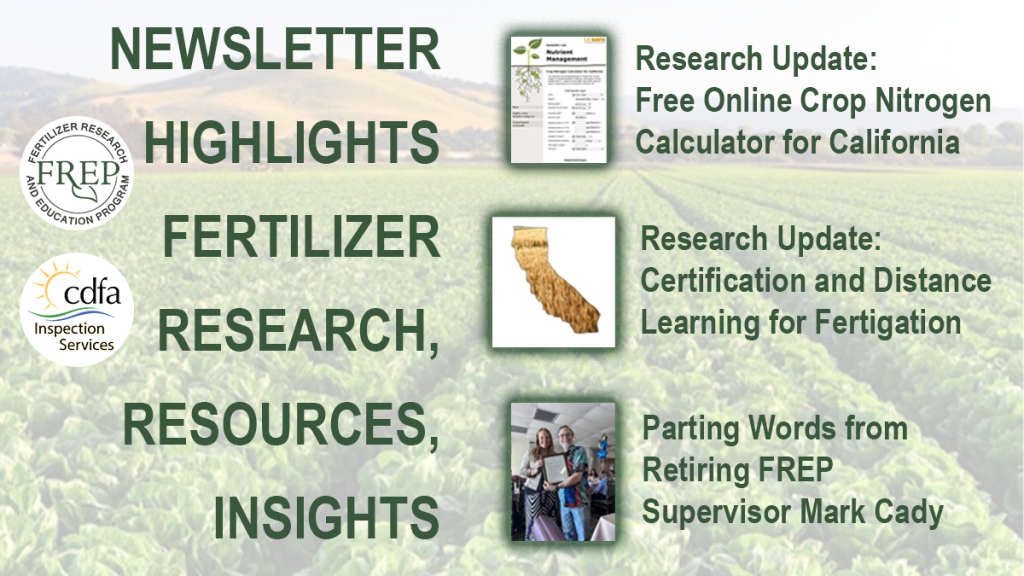
Click here to view and subscribe to our Fertilizer Research and Education Program (FREP) “Bringing Research into Practice” newsletter.


Click here to view and subscribe to our Fertilizer Research and Education Program (FREP) “Bringing Research into Practice” newsletter.
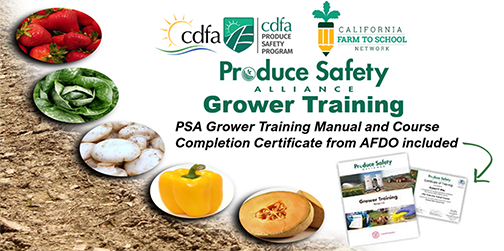
The California Department of Food and Agriculture (CDFA) Produce Safety Program is partnering with the CDFA Office of Farm to Fork to provide Produce Safety Alliance (PSA) Grower Training Courses July 22-23 and Sept. 23-24 at no cost to California Farm to School Network produce growers and handlers. The free training also is open to all interested California produce growers and handlers.
The PSA Grower Training Course covers Food Safety Modernization Act (FSMA) Produce Safety Rule requirements that set food safety standards for the production of fresh fruits, vegetables and tree nuts. It also covers good agricultural practices for the enhanced safety of fresh, nutritious and wholesome produce supplied to local schools and communities across the state. Course completion fulfills the FSMA Produce Safety Rule requirement that “at least one supervisor or responsible party from your farm must have successfully completed food safety training equivalent to that received under a standardized curriculum recognized as adequate by the Food and Drug Administration.”
Click here to view a Produce Safety Rules! blog for further details and to register for the course.
CDFA’s California Farm to School Network endeavors to source school meals from regional farms and educate students about food to ensure California students have access to fresh, nutritious, locally sourced produce. This initiative is an interagency, multi-pronged effort to reimagine school meals while benefitting students, the environment, local farmers and local economies. CDFA’s Produce Safety Program (PSP) conducts on-farm inspections on behalf of the U.S. Food and Drug Administration to verify FSMA Produce Safety Rule compliance. PSP’s “educate before and while we regulate” goal helps California produce growers and handlers understand enhanced produce safety practices.
CDFA is announcing three vacancies on the Fertilizer Inspection Advisory Board. The board advises the CDFA secretary on the agency’s Fertilizing Materials Inspection Program (FMIP), which ensures fertilizing materials are safe, effective and meet quality guarantees.
As part of the program, FMIP inspectors and investigators located throughout the state conduct routine sampling and inspections, respond to consumer complaints, and enforce laws and regulations that govern the manufacturing and distribution of fertilizing materials. FMIP is funded by fertilizing materials license and product registration fees and mill assessments.
There are two member positions and one public member position available on the board. The term of office for board members is up to three years. Board members receive no compensation but are entitled to reimbursement of necessary travel expenses in accordance with the rules of the California Department of Human Resources. Member applicants must hold a current fertilizing materials license or be a representative of a licensed firm.
Individuals interested in a board appointment must submit a resume and a completed Prospective Member Appointment Questionnaire by August 29, 2025. The questionnaire is available on the CDFA website at http://www.cdfa.ca.gov/is/ffldrs/pdfs/PMAQ_Fertilizer_IAB.pdf.
Application materials may be sent via email to Brittnie.Williams@cdfa.ca.gov and Elizabeth.Moseby@cdfa.ca.gov, or by mail to:
CDFA Feed, Fertilizer and Livestock Drugs Regulatory Services Branch
Attn: Brittnie Williams/Elizabeth Moseby
1220 N Street
Sacramento, CA 95814
For more information, please visit the FMIP website at https://www.cdfa.ca.gov/is/ffldrs/fertilizer.html or contact Brittnie Williams or Elizabeth Moseby at (916) 900-5022 or the email addresses above.
Click here to view this original CDFA news release.
Click here to view a California Department of Food and Agriculture (CDFA) Fertilizer Research and Education Program Irrigation and Nitrogen Management Training newsletter.
Did you complete the CDFA Irrigation and Nitrogen Management Program (INMP) self-certification training between Jan. 1 and June 30, 2022? Check out this newsletter to learn how to renew your eligibility to self-certify INMP Worksheets.
Other newsletter topics include:
Click here to view the newsletter!
CDFA’s Fertilizer and Research Education Program (FREP) is part of the Feed, Fertilizer and Livestock Drugs Regulatory Services Branch of the Division of Inspection Services.
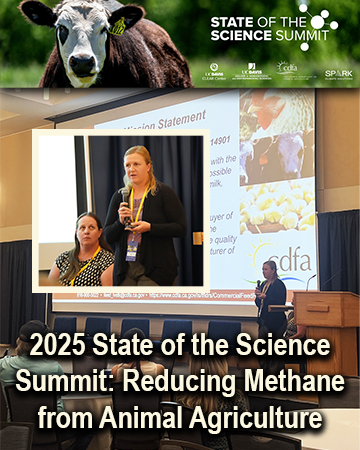
California Department of Food and Agriculture (CDFA) Commercial Feed Regulatory Program (CFRP) officials recently presented at the State of the Science Summit: Reducing Methane from Animal Agriculture at UC Davis.
CFRP Manager Rachelle Kennedy and Safe Animal Feed Education (SAFE) Program Senior Environmental Scientist KC Gutenberger’s presentation focused on the regulatory process for gaining state and federal approval for the use of feed additives or drugs intended to reduce enteric methane emissions in animal agriculture.
Visit the SAFE Feed and Feed Ingredients webpage for more information about the laws and processes in place to help maintain a safe food supply while incorporating innovative products intended to reduce greenhouse gas emissions. Click here to learn more about the UC Davis College of Agricultural and Environmental Sciences Clear Center’s 2025 State of the Science Summit.
CDFA’s Commercial Feed Regulatory Program and Safe Animal Feed Education Program are part of the Feed, Fertilizer and Livestock Drugs Regulatory Services Branch of the Inspection Services Division.
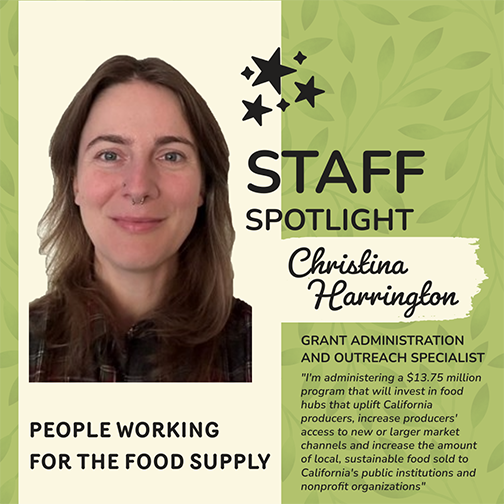
NAME: Christina Harrington ( you can call me Chris 🙂 )
TIME AT CDFA: 1 year and 3 months
PROGRAM: Farm to Community Food Hubs Program
POSITION TITLE: Grant Administration and Outreach Specialist
USUAL DAILY ACTIVITIES ON THE JOB? When I’m not creating grant program materials, I’m supporting grant applicants navigate the application process, providing one-on-one application assistance, and sharing resources about food hubs to producers, food hub operators and other food system partners. I strategize how to engage stakeholders, develop outreach materials, design training for grant technical reviewers and collaborate with my Farm to School colleagues to ensure we’re providing the best support for food hubs and producers in California.
HOW DO YOU WORK FOR THE CALIFORNIA FOOD SUPPLY? I’m administering a $13.75 million program that will invest in food hubs that uplift California producers, increase producers’ access to new or larger market channels and increase the amount of local, sustainable food sold to California’s public institutions and nonprofit organizations.
THOUGHTS OF WORKING AT INSPECTION SERVICES? This is one of the most supportive work environments I’ve ever been in. My colleagues and supervisors are genuinely kind, fun, respectful and entrust me to do the work.
MEMORABLE MOMENT ON THE JOB? Going on a ride along with a food hub operator. It was special to see him interact with small-scale farmers and local food bank staff and witness the kind of labor and relational work that goes into supporting the local food system. Plus, it was great to be out in the field again lifting produce boxes!
PHILOSOPHY OF LIFE? All that I do should further kindness and love – to others, the earth and myself.
FAVORITE PASTIME? Kayaking and cuddling with my kittens.
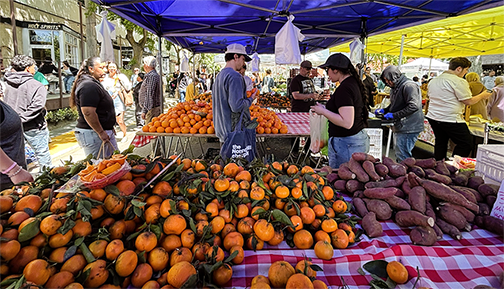
CDFA’s Office of Farm to Fork is pleased to announce that 12 projects across the state and the people they serve are now benefiting from more than $30 million in California Nutrition Incentive Program (CNIP) Grant funding.
The projects will endeavor to increase the purchase of California-grown fresh fruit and vegetables by CalFresh shoppers at 303 Certified Farmers’ Markets, Community Supported Agriculture programs, mobile markets, and small retailers statewide.
2025 CNIP Grant funding is being distributed in two phases over 2.5 years. Phase I this year is comprised solely of state funding. Phase II next year is state funding that may be augmented by federal funding. Grantees are eligible to receive funding in both phases.
CNIP has been shown to support CalFresh shoppers by empowering them to increase their consumption of fruits and vegetables. For every benefit dollar they spend, shoppers receive an additional dollar that can be spent on fruits and vegetables at the market or retail outlet, within set parameters.
“I’m eating better because I can afford to get fresh food, fresh vegetables and fruit that I wouldn’t get otherwise,” a CalFresh shopper said about the program in a study by the Nutrition Policy Institute (UC Agriculture and Natural Resources). “It gives me a chance to taste and to eat foods that I might not otherwise be exposed to.”
CNIP supports local farmers by increasing demand for their California-grown fresh fruits and vegetables. CNIP has been shown to have a positive effect on the local economy, with every $1 in CNIP incentives generating $3 in local economic activity.
A detailed list of grantees and project descriptions is available on the CNIP webpage.
CNIP is administered by CDFA’s Office of Farm to Fork, which leads CDFA’s food access work.
Click here to view this original CDFA Planting Seeds blog post.
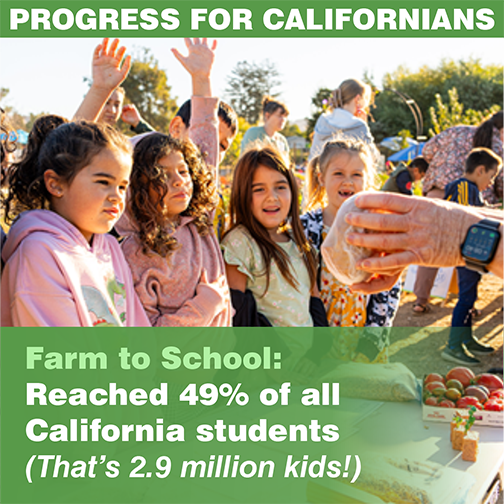
CDFA’s report “Progress for California” highlights a variety of ways that agency programs benefit the state. The Farm to School initiative is a great example — a vital approach to improve the health and well-being of California schoolchildren through food-based education and healthy food access. California schools serve hundreds of millions of meals each year, and expanding opportunities for local food procurement tied to education is essential for establishing healthy eating habits that children can carry into adulthood.
The Farm to School Incubator Grant Program has invested $86 million in 375 projects, reaching 49 percent of all California students – that’s 2,850,196 students served by 269 California school districts!
Click here to view this original CDFA Planting Seeds blog post.
CDFA’s Farm to School Program is part of the Office of Farm to Fork in the Inspection Services Division.
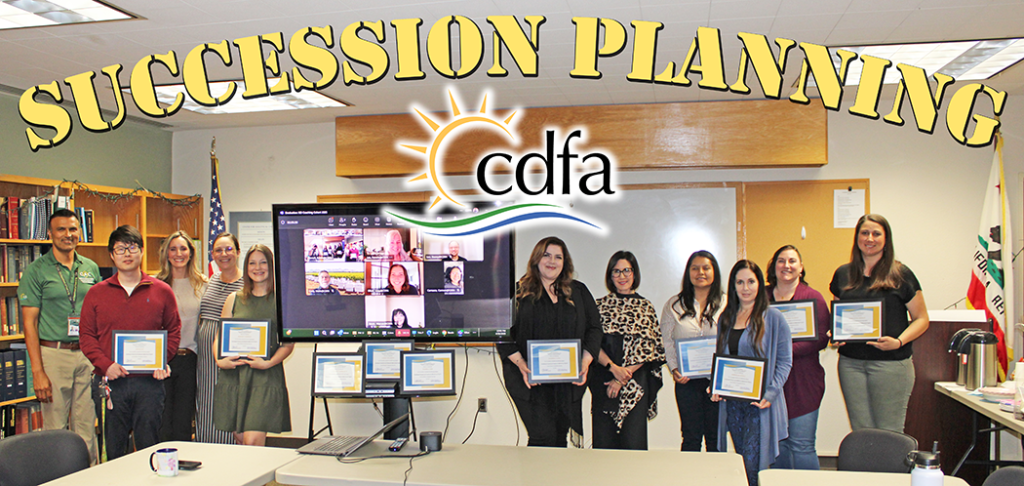
Ten CDFA staff members graduated last week from the agency’s Coaching for Personal and Professional Effectiveness Program, a course that provides improved communication skills for work and life and prepares employees to take on leadership positions.
With 24 percent of agency employees at retirement age, and another 12 percent within five years of retirement eligibility, CDFA is prioritizing succession planning programs like this.
The course curriculum included group and individual learning, various personality and behavioral assessment tools, and customized one-on-one professional coaching sessions. Graduates commented the course provided practical skills for talking through difficult conversations, learning the power of saying less through thinking before responding, public speaking, and setting up the framework for leading staff.
Congratulations to this year’s graduates!
Deborah Ayala, Citrus Pest and Disease Prevention Division
Andrea Cano, State Organic Program
Sarah Cardoni, Inspections Services Division
Carmen Carrasco, Farm Equity Office
Lizzy Elliott, Farm to School Program
Leslie Fernandez, State Organic Program
Jennifer Harmon, Fertilizer Research and Education Program
David Ko, Division of Marketing Services
Pamela Lee, Farm to School Program
Samantha Moran-Defty, Feed, Fertilizer and Livestock Drugs Regulatory Services Branch
Click here to view this original CDFA Planting Seeds blog.
In recognition of Earth Week, CDFA is spotlighting its Food Recovery webpage, dedicated to reducing food waste.
The USDA reports that 30-40 percent of the U.S. food supply turns to food waste. CalRecycle reports that Californians discards 5-6 million tons of food every year.
The Food Recovery Hierarchy (right) and CDFA programs help consumers as well as farmers and ranchers reduce food waste through recycling and reuse, resulting in more food for people, feed for animals, and a series of additional uses beneficial to the environment.
There are several examples of agency programs that reflect the values of the hierarchy.
The Office of Agricultural Resilience and Sustainability (OARS), through its Healthy Soils Program, offers grants for activities like the mulching of almond shells to help reduce the evaporation of surface water while building highly-coveted organic matter in soil.
CDFA’s Rendering Program oversees the re-use of inedible kitchen grease for an array of products, including biofuel, soaps, cosmetics, shampoos, and feed for the livestock, poultry and pets.
And the agency’s Commercial Feed Regulatory Program offers an incentivized tax rate for commercial feed producers that upcycle human food byproducts to animal feed within California’s livestock feed industry.
The reduction of food waste is a serious worldwide concern, and CDFA is committed to contributing to the effort.
Click here to view this original CDFA Planting Seeds blog post.